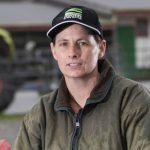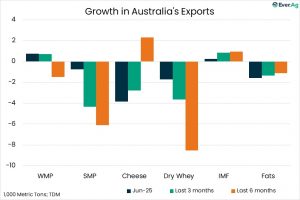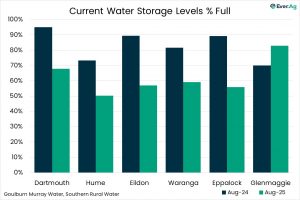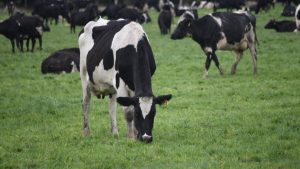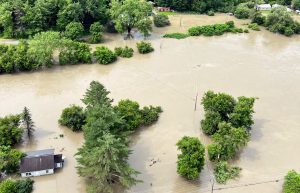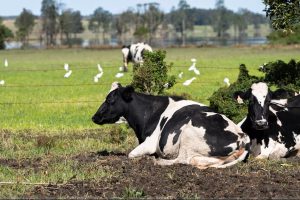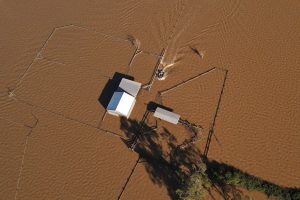
Key points:
A settlement was reached with Powercor in November after the blaze was started by a fallen power pole
Farmers say they can’t continue with business as usual as they have no timeline on when they will receive compensation
The summer’s bushfires brought back painful memories for many of the people caught in the 2018 emergency
A fire started when a power pole on a farm in Garvoc snapped and fell due to high winds around 9:00pm.
Many in the region, including dairy farmers Jill and Brad Porter, lost hundreds of livestock, sheds and kilometres of fencing.
To rebuild, most of the money had to come from their own pockets.
“The first 12 to 18 months, and even somewhat today, you spend a lot of time physically and mentally trying to get your farm back into a position where it can function,” Ms Porter said.
In November, a class action run by Hall & Wilcox and three insurance companies on behalf of the Garvoc and surrounding communities agreed to a settlement with Powercor.
The insurers — IAG, QBE and Allianz — are also awaiting compensation as they provided some initial financial assistance towards the rebuild.
But Ms Porter said the power company, which the community believes should take full liability for the fire, was dragging its feet to delay a payout.
“There’s certainly no compassion, and there’s no willingness to accept responsibility and move forward,” she said.
“It is a fire that shouldn’t have happened, because it happened due to failed power infrastructure.”
‘We’re in limbo’
Ms Porter said many farmers who had rebuilt were unable to continue with business as usual, as they had no timeline on when they would be paid.
“You can’t really move forward when you don’t have concrete ideas as to where you’re at financially,” she said.
“It’s very difficult to make business decisions, it’s very difficult to get back on your feet.
“That has a physical and mental toll, there’s a significant degree of fatigue that kicks in.”
Edward Conheady runs two dairies in Garvoc and he said the future of his business was in limbo.
“We just have to go to the bank and borrow and borrow more money until such time that hopefully we get paid,” he said.
“All these bills have had to be paid; that’s what’s put a lot of stress on a huge number of people.”
Mr Conheady has rebuilt his farms after losing more than 30 kilometres of fencing, about 3,000 tonnes of premium fodder and 2,000 tonnes of silage.
“We lost a total of 850 acres. We had 350 dry cows in one mob that were hit by the main fire front, but luckily the main milking herd escaped the fire,” he said.
“We were losing cows up to two months after the fires.”
The repercussions could last for years, he said.
“Quite a bit of damage was done with mastitis and lost production which you can’t claim on insurance, but it’s a real cost and it certainly does add up.
“We had to sell over 800 head of steers prematurely, over 12 months earlier than we normally would as [the fires] coincided with the drought.”
The fire started on Jack Kenna’s farm. He said Powercor needed to take responsibility and pay up so affected farmers could move on with their lives.
“It’s a battle because you wouldn’t expect to be still having loose ends to tie up two years on,” he said.
“It’s stressful enough getting burnt out without having to kick and scratch and bark to try and get things settled.”
Losing the irreplaceable
The Porters lost more than 300 cattle in the fires, all third-generation Jersey cows that had genetics dating back 80 years.
“You can’t replace the genetics that were lost on the night of St Patrick’s Day,” Ms Porter said, adding that her husband struggled with the loss of his herd, which were his best mates.
“That’s the tragedy of our fire, in our family — it took the very thing that probably means the most to him.
“How do you put spirit back in a man? How do you give him back his passion?
“You start to rebuild, and we’ll move forward and he will have his beautiful herd again, but it takes a long time to breed cattle.”
Mr Kenna said the summer’s bushfires brought back painful memories.
“You never get over it because it’s always in the back of your mind … people are definitely struggling,” he said.
And for Ms Porter, the vision is still alive in her mind.
“We’re two years on and I still have nightmares,” she said.
“I can very much put myself back where they’re at — everything is black, the smell is horrific, the dust.”
‘Don’t do it alone’
Ms Porter said all of the bureaucracy after a fire was overwhelming, and people needed to take a break from the paperwork and do something they enjoyed.
“Take time. Look after the people you love, who are important to you … just move forward as you can.
“Seek help. Don’t be afraid to say, ‘I’m struggling’, don’t be afraid to laugh or to cry.
“As farmers, we work such long, hard hours, often on our own, and it’s very difficult in the immediate aftermath of the fire.”
Blaze Aid coordinator Christine Male said farmers were particularly at risk of mental health issues after disasters.
“Farming is such an isolated industry; they’re on their own and they’ve got all day to think and stew about things,” she said.
“The financial implications are huge, the stress loads are huge, and many farmers have responded well, but I think there are many struggling.
“Hang in there, there are millions of Australians that care for you.”
‘Assessment of claims underway’
Mr Kenna said the trauma from the fire was exacerbated by the ongoing fight for justice.
“The way that Powercor and the Government have treated us is 100 times worse than the fire,” he said.
“Daniel Andrews and his Government have let us down and sided with the infrastructure that let us down.
“But Daniel Andrews inherited a system that was well and truly broken and past its used-by date, and now is the time to fix it.”
But Ms Porter said she would continue the battle until the Government updated Energy Safe Victoria’s safety guidelines and regulations.
“I don’t stand up and advocate because it’s happened to us, I stand up and advocate because I’m terrified it’s going to happen again, either to us, or to another community.”
A government spokesperson said community safety continued to be the top priority for the Government.
“We are building a stronger and more accountable energy regulator to keep Victorians safe, with the appointment of a skilled three-person board of commission,” they said.
A Powercor spokeswoman said in 2019 the company undertook significant additional testing in order to reassure people in the south-west that poles were safe and that this was independently corroborated by Energy Safe Victoria.
“As a result of this work and other technical studies on our poles, we have also changed our pole inspection and maintenance strategies to increase the amount of sound wood required for poles to remain on our network and manage the age profile of the pole population,” she said.
“We have settled the Garvoc class action; assessments of claims by members of the insurer group are underway.”
The company said an extensive bushfire mitigation program operates year-round to ensure it was delivering power safely to customers.

